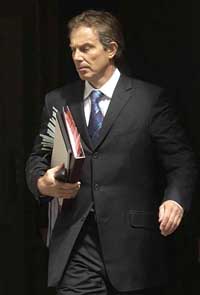Britain's prime minister will make announcement on his future Thursday
Prime Minister Tony Blair on Thursday was expected to publicly announce a timetable for his resignation, putting a new leader at the head of the government within weeks.

Blair, who marked his 10th anniversary in office earlier this month, planned to meet briefly with his Cabinet before traveling to his Sedgefield constituency in northern England to make the public announcement.
It's an announcement that Blair's Labour Party, and the nation, have been expecting for nearly three years, ever since the prime minister said in 2004 that his third term would be his last.
"Today, the beginning of the end," said the front page of The Guardian newspaper.
Treasury chief Gordon Brown, who was Blair's partner in reforming the party as "New Labour" but an impatient rival in government, is the odds-on favorite to be the next prime minister.
Brown has already declared he will be a candidate; at least one opponent from the party's left wing was expected to announce his candidacy Thursday afternoon. A new prime minister is likely to be in place by early July.
The Iraq war, a police investigation of allegations that the government traded honors for political contributions, and endless questions about when Blair would step down overshadowed his last term in government, after winning the third term in May 2005.
Blair has stopped short of openly endorsing Brown, a stern Scot who has long coveted the top job, but said last week that Brown would make "a great prime minister."
"One of the things I very much hope will be part of the legacy of the government is the strongest economy in the Western world, which he has been responsible for," Blair said.
Blair, 54, led Labour to two landslide election wins in 1997 and 2001, and a narrower but still comfortable victory in 2005.
The first term was marked by several significant initiatives: the Bank of England was given the freedom to set interest rates, Scotland and Wales were given regional governments, London gained an elected mayor and all but 92 hereditary members were ejected from the House of Lords.
In 1998, Blair and Irish Prime Minister Bertie Ahern led successful negotiations for a peace agreement in Northern Ireland, launching a process which reached its culmination earlier this week as former enemies from the Protestant and Catholic communities joined to form a new regional government.
The Iraq war severely dented Blair's popularity. Blair's close alliance with U.S. President George W. Bush was unpopular at home and there were mass marches in Britain opposing the U.S.-led invasion before it began. The government's claims that Saddam Hussein was building an arsenal of weapons of mass destruction proved false.
For more than a year, Labour has consistently trailed in opinion polls behind a Conservative Party revived by its new leader, David Cameron.
In local and regional elections earlier this month, Labour lost hundreds of seats in city and county councils and was beaten into second place in the Scottish Parliament elections by the Scottish National Party, which advocates independence.
In recent months, Blair's thoughts have turned to the lessons of his decade in power.
"When I first started in politics, I wanted to please everyone," Blair said during a valedictory tour of the Middle East in December. "After a time I learned that you can't please everyone, and you learn that the best thing is to do what you think is right and everyone can make their judgment."
A poll published Thursday by the Guardian found that 80 percent of Labour supporters believed Blair had been good for the country, though only 44 percent of the total sample agreed.
Sixty-four percent thought Blair had been too preoccupied with foreign policy, 58 percent said he was a disappointment "given the initial expectations," and 53 percent thought his style was "too presidential."
Forty-four percent rated Blair as courageous and honest. The poll, based on telephone interviews with 1,005 adults on April 20-22, had a margin of error of plus or minus 3 percentage points.
Subscribe to Pravda.Ru Telegram channel, Facebook, RSS!




